Related Research Articles

Mariupol is a city in Donetsk Oblast, Ukraine. It is situated on the northern coast (Pryazovia) of the Sea of Azov, at the mouth of the Kalmius River. Prior to the Russian invasion of Ukraine, it was the tenth-largest city in the country and the second-largest city in Donetsk Oblast, with an estimated population of 425,681 people in January 2022; Ukrainian authorities estimate the population of Mariupol at approximately 100,000. Mariupol has been occupied by Russian forces since May 2022.

The war in Donbas, or Donbas war, was a phase of the Russo-Ukrainian War in the Donbas region of Ukraine. The war began 12 April 2014, when a fifty-man commando unit headed by Russian citizen Igor Girkin seized Sloviansk in Donetsk oblast. The Ukrainian military launched an operation against them. It continued until it was subsumed by the Russian invasion of Ukraine in February 2022.
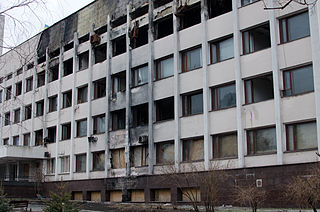
During the unrest in Ukraine in the aftermath of the 2014 Ukrainian revolution, the city of Mariupol, in Donetsk Oblast, saw skirmishes break out between Ukrainian government forces, local police, and separatist militants affiliated with the Donetsk People's Republic. Government forces withdrew from Mariupol on 9 May 2014 after heavy fighting left the city's police headquarters gutted by fire. These forces maintained checkpoints outside the city. Intervention by Metinvest steelworkers on 15 May 2014 led to the removal of barricades from the city centre, and the resumption of patrols by local police. Separatists continued to operate a headquarters in another part of the city until their positions were overrun in a government offensive on 13 June 2014.

The Azov Assault Brigade is a formation of the National Guard of Ukraine formerly based in Mariupol, in the coastal region of the Sea of Azov, from which it derives its name. It was founded in May 2014 as the Azov Battalion, a volunteer paramilitary militia under the command of Andriy Biletsky to fight pro-Russian forces in the war in Donbas. It was formally incorporated into the National Guard on 11 November 2014, and redesignated Special Operations Detachment "Azov", also known as the Azov Regiment. In February 2023, the Ukrainian Ministry of Internal Affairs announced that Azov was to be expanded as a brigade of the new Offensive Guard.

Russian war crimes are the violations of the international criminal law including war crimes, crimes against humanity and the crime of genocide which the official armed and paramilitary forces of the Russian Federation are accused of committing since the dissolution of the Soviet Union in 1991. These accusations also extend to the aiding and abetting of crimes which have been committed by quasi-states or puppet states which are armed and financed by Russia, including the Luhansk People's Republic and the Donetsk People's Republic. These war crimes have included murder, torture, terrorism, deportation or forced transfer, abduction, rape, looting, unlawful confinement, unlawful airstrikes or attacks against civilian objects, and wanton destruction.
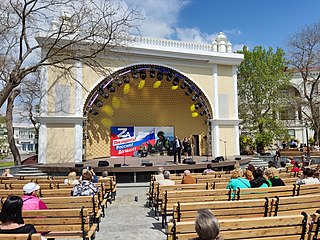
As part of the Russian invasion of Ukraine, the Russian state and state-controlled media have spread disinformation in an information war. Ukrainian media and politicians have also been accused of using propaganda and deception, although such efforts have been much more limited than Russia's disinformation campaign. Both Russia and Ukraine exaggerate the losses they claim to have inflicted on each other.
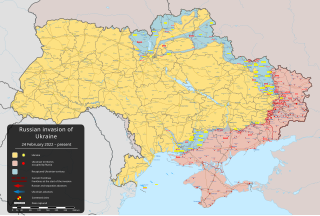
On 24 February 2022, Russia invaded Ukraine in an escalation of the Russo-Ukrainian War that started in 2014. The invasion was the largest attack on a European country since World War II. It is estimated to have caused tens of thousands of Ukrainian civilian casualties and hundreds of thousands of military casualties. By June 2022, Russian troops occupied about 20% of Ukrainian territory. About 8 million Ukrainians had been internally displaced and more than 8.2 million had fled the country by April 2023, creating Europe's largest refugee crisis since World War II. Extensive environmental damage caused by the war, widely described as an ecocide, contributed to food crises worldwide.

Since the beginning of the Russian invasion of Ukraine in 2022, the Russian military and authorities have committed many deliberate attacks against civilian targets, massacres of civilians, torture and rape of women and children, torture and mutilitation of Ukrainian prisoners of war, and indiscriminate attacks in densely populated areas.

The siege of Mariupol began on 24 February 2022 and lasted until 20 May, as part of the Russian invasion of Ukraine. It saw fighting between the Russian Armed Forces and the Ukrainian Armed Forces for control over the city of Mariupol in southeastern Ukraine. Lasting for almost three months, the siege ended in a victory for Russia and the Donetsk People's Republic, as Ukraine lost control of the city amidst Russia's eastern Ukraine offensive and southern Ukraine offensive; all Ukrainian troops remaining in the city surrendered at the Azovstal Iron and Steel Works on 20 May 2022, after they were ordered to cease fighting.
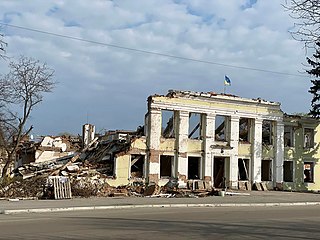
The battle of Okhtyrka was a military engagement in and around Okhtyrka city in Sumy Oblast of Ukraine. It began on 24 February 2022, as part of the northern Ukraine offensive during the 2022 Russian invasion of Ukraine. Fighting began in the outskirts of the city as Russian forces attempted to occupy the city. The initial advance was repelled, and the city was attacked by artillery fire. On March 26, 2022, it was reported that the strategic stronghold of Trostianets was taken back by Ukrainian Forces. This disrupted Russian communications and supply routes, threatening the Russian front.

Vadym Serhiyovych Boychenko is a Ukrainian politician who serves as the de jure mayor of Mariupol in Donetsk Oblast, Ukraine since 2015. Boychenko served as mayor during the 2022 Russian invasion of Ukraine and Siege of Mariupol, during which the city has been "completely destroyed", according to President Volodymyr Zelenskyy.
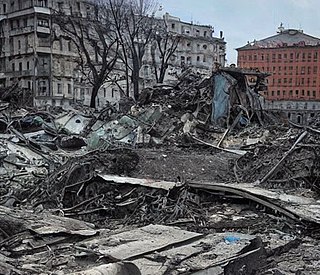
The battle of Volnovakha was a military engagement which lasted from 25 February 2022 until 12 March 2022, as part of the Eastern Ukraine offensive during the 2022 Russian invasion of Ukraine. Russian and DPR forces engaged Ukrainian forces at the small city of Volnovakha in Donetsk Oblast, which is located close to the Ukrainian-DPR border.

On 9 March 2022, the Russian Air Force bombed Maternity Hospital No 3, a hospital complex functioning both as a children's hospital and maternity ward in Mariupol, Ukraine, during the Russian invasion of Ukraine, killing at least four people and injuring at least sixteen, and leading to at least one stillbirth.

On 16 March 2022, during the Russian invasion of Ukraine, the Russian Armed Forces bombed the Donetsk Academic Regional Drama Theatre in Mariupol, Ukraine. It was used as an air raid shelter during the siege of Mariupol, sheltering a large number of civilians. The estimations of the number of deaths that occurred due to the bombing have varied, from at least 12 to 600.

The Bucha massacre, also known as the Bucha Genocide was the mass murder of Ukrainian civilians and prisoners of war by the Russian Armed Forces during the fight for and occupation of the city of Bucha as part of the Russian invasion of Ukraine. Photographic and video evidence of the massacre emerged on 1 April 2022 after Russian forces withdrew from the city.

Denys Hennadiyovych Prokopenko is a Ukrainian military officer, a Lieutenant Colonel in the National Guard of Ukraine, and Commander of the Azov Regiment. From 2014 until his capture in May 2022 by Russian forces, he fought against Russia and pro-Russian separatist forces in the Donbas in the ongoing Russo–Ukrainian War.

The battle of Sievierodonetsk was a military engagement in the wider battle of Donbas of the Eastern Ukraine offensive during the Russian invasion of Ukraine.
The most significant using of incendiary weapons were used a number of times during the Russo-Ukrainian War. Russians were accused of using white phosphorus bombs multiple times; in the Battle of Kyiv and against Kramatorsk in March 2022, against dug-in defenders at the Azovstal steel plant in Mariupol in May 2022, and in Marinka over the 2022 Christmas holiday. White phosphorus is a toxic chemical, and exposure to vapors leads to long-term ailments of the body, up to permanent disfigurement and death through organ failure.

During the Russian invasion of Ukraine, Russian authorities and armed forces have committed war crimes by carrying out deliberate attacks against civilian targets and indiscriminate attacks in densely-populated areas. The United Nations Human Rights Monitoring Mission in Ukraine says the Russian military exposed the civilian population to unnecessary and disproportionate harm by using cluster bombs and by firing other weapons with wide-area effects into civilian areas, such as missiles, heavy artillery shells and multiple launch rockets. As of the beginning of July 2023, the attacks had resulted in the documented deaths of between 9,300 and 16,500 civilians. On 22 April 2022, the UN reported that 92.3% of civilian deaths were attributable to the Russian armed forces.
This timeline of the Russian invasion of Ukraine covers the period from 24 February 2022, when Russia launched a military invasion of Ukraine, to 7 April 2022 when fighting focused away from the north and towards the south and east of Ukraine.
References
- 1 2 3 Ibrahim, Nur (24 February 2022). "Is Russia Using Mobile Crematoriums to Hide Evidence of Casualties in Ukraine?". Snopes. Archived from the original on 12 August 2022. Retrieved 12 August 2022.
- 1 2 3 Nicholls, Dominic (23 February 2022). "Russia deploys mobile crematoriums to follow its troops into battle". Telegraph. Archived from the original on 26 February 2022. Retrieved 12 August 2022.
- ↑ Karmanau, Yuras; Leicester, John; Keyton, David (21 June 2022). "'Everything that can burn is on fire' as Russia bombards eastern Ukraine". PBS. Associated Press. Archived from the original on 12 August 2022. Retrieved 12 August 2022.
- ↑ Roth, Andrew (21 June 2022). "Russia blocks Telegraph website over Ukraine reporting". The Telegraph. Archived from the original on 12 August 2022. Retrieved 12 August 2022.
- ↑ Mackintosh, Eliza (23 March 2022). "The bodies of Russian soldiers are piling up in Ukraine, as Kremlin conceals true toll of war". CNN. Archived from the original on 27 March 2022. Retrieved 12 August 2022.
- ↑ "Burning bodies: Ukraine accuses Russia of covering up atrocities". Al-Jazeera. 6 April 2022. Archived from the original on 12 August 2022. Retrieved 12 August 2022.
- 1 2 Epstein, Jake (6 April 2022). "Ukraine says Russia is using 'mobile crematoriums' to burn the bodies of civilians in Mariupol and hide evidence of war crimes". Business Insider. Archived from the original on 12 August 2022. Retrieved 12 August 2022.
- 1 2 Karmanau, Yuras; Schreck, Adam; Anna, Cara (12 April 2022). "Mariupol mayor says siege has killed more than 10K civilians". The Associated Press. Archived from the original on 12 April 2022. Retrieved 12 August 2022.